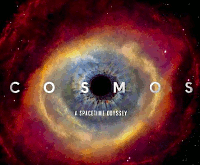
SL.CCS.1/2/3/4 Grades 6-12: An essay of a current news event is provided for discussion to encourage participation, but also inspire the use of evidence to support logical claims using the main ideas of the article. Students must analyze background information provided about a current event within the news, draw out the main ideas and key details, and review different opinions on the issue. Then, students should present their own claims using facts and analysis for support.
FOR THE WEEK OF MAR. 17, 2014
‘Cosmos’ science series on TV aims to show how ‘we’re all connected’
A scientist with an engaging delivery and lots of TV experience hosts a new weekly series, Cosmos: A Spacetime Odyssey, that explores his field in a way that may surprise you. Instead of just presenting information about our universe that is already known, astrophysicist Neil deGrasse Tyson questions the unknown with wonder, excitement and stunning visuals. "What we really want is for people to say, 'Wow, I didn't know we were all connected in that way,' " the host says. "That’s the goal."
The 13-part program airs Sunday nights (9 p.m. Eastern, 8 p.m. Central) on Fox, FX, National Geographic and in 70 foreign counties. It’s a new version of an award-winning 1980 series on PBS hosted by astronomer Carl Sagan, who died in 1996. His widow, Ann Druyan, is co-producer of the new version – which began March 9 with a taped presidential introduction. "Open your eyes, open your imagination," Barack Obama said. "The next great discovery could be yours."
It’s earning praise from viewers and writers, including science historian Audra Wolfe: "Tyson, the director of the Hayden Planetarium at the American Museum of Natural History [in New York], may be the best science popularizer we have today," she writes in The Atlantic magazine. Tyson spoke last year about his lifelong enthusiasm for discovery, which he brings to the show. "Science is the wiring of your brain and how you look at the world because of that wiring. It’s not the result. It's not just an answer. It is a process," he said. "And you need to learn to love the questions themselves. And when you do, the universe is yours." (Catch up by watching full episodes at cosmosontv.com.)
![]() Host says: "The purpose of Cosmos is not to be a textbook to tell people about the latest discoveries. The whole point of telling these stories is to allow you to understand that science, the scientific method, is central to all of our lives." -- Neil deGrasse Tyson
Host says: "The purpose of Cosmos is not to be a textbook to tell people about the latest discoveries. The whole point of telling these stories is to allow you to understand that science, the scientific method, is central to all of our lives." -- Neil deGrasse Tyson
![]() Scientist says: "Every one of us should root for the success of this program. . . . If it makes money, maybe we will see more science series on mainstream TV and science will become better integrated into our culture." -- Lawrence M. Krauss, Arizona State University physicist
Scientist says: "Every one of us should root for the success of this program. . . . If it makes money, maybe we will see more science series on mainstream TV and science will become better integrated into our culture." -- Lawrence M. Krauss, Arizona State University physicist
![]() Blogger says: "The original Cosmos series with Carl Sagan awakened a scientific wonder among millions of people who would never have watched a television show about science." – James Maynard of TechTimes.com
Blogger says: "The original Cosmos series with Carl Sagan awakened a scientific wonder among millions of people who would never have watched a television show about science." – James Maynard of TechTimes.com
Front Page Talking Points Archive
►NASA prepares for return to the moon, starting with an orbital mission by four astronauts
►Minneapolis roundups and woman's death intensify debate over immigration agents' tactics
►Australia is a test case for social media age limits, with 16 as a minimum for accounts there now
►U.S. actions at sea against suspected drug smugglers raise military law issues
►Say goodbye to new pennies, a coin that outlived its purpose after 232 years
►Show of force: U.S. naval and air buildup near Venezuela signals possible military action
►Google targets organized scammers in China to block online access
